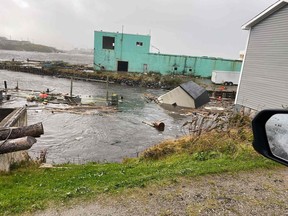The storm could prove to be one of Canada's costliest natural disasters, with hundreds of thousands without power. It could take weeks to restore essential services
Author of the article:

PORT AUX BASQUES — It will take several months for Canada to restore critical infrastructure after the powerful storm Fiona left an “unprecedented” trail of destruction, officials said on Sunday.
“It’s like a complete war zone,” said Brian Button, mayor of Port aux Basques, one of the hardest hit towns on the southwest tip of Newfoundland with just over 4,000 residents. “We have one missing person,” Button told the Canadian Broadcasting Corp (CBC).
Sign up to receive the daily top stories from the National Post, a division of Postmedia Network Inc.
Thanks for signing up!
A welcome email is on its way. If you don't see it, please check your junk folder.
The next issue of NP Posted will soon be in your inbox.
No fatalities have been confirmed so far.
Fiona slammed into eastern Canada on Saturday, forcing evacuations as wind reached up to 170 km per hour (106 miles per hour).
Button said it may take months to get some people back in their homes in Port aux Basques after an apartment building and more than 20 homes were destroyed or dragged into the sea by the storm surge.
While the full scale of Fiona’s devastation is not immediately clear, the storm could prove to be one of Canada’s costliest natural disasters.
Scientists have not yet determined whether climate change influenced Fiona, but in general the warming of the planet is making hurricanes wetter, windier and altogether more intense.
Canada’s federal government is sending in the armed forces on Sunday to help clear fallen trees and debris, which will in turn open the way for crews to restore power, Emergency Preparedness Minister Bill Blair told Reuters.
The province of Nova Scotia requested the troops and machinery to clear debris Saturday, “and we said yes, and so they’re being deployed today,” Blair said. Other provinces are also in discussions about federal aid, Blair said.
The Canadian Hurricane Centre estimated that Fiona was the lowest-pressured storm to make landfall on record in Canada. In 2019, Dorian hit the region around Halifax, Nova Scotia, blowing down a construction crane and knocking out power. Fiona, on the other hand, appears to have caused major damage across at least five provinces.
“The scale of what we’re dealing with, I think it’s unprecedented,” Blair said on Sunday.
“There is going to be… several months’ work in restoring some of the critical infrastructure – buildings and homes, rooftops that have been blown off community centers and schools,” he said.
Hundreds of thousands of residents across Nova Scotia, Prince Edward Island (PEI), Newfoundland, Quebec and New Brunswick remained without power on Sunday.
“When it’s all said and done… Fiona will turn out to have caused the most damage of any storm we’ve seen,” Nova Scotia Premier Tim Houston told the CBC.
Officials warned on Saturday that in some cases it would take weeks before essential services are fully restored.
Prime Minister Justin Trudeau had convened a meeting of his emergency response group for Sunday to coordinate the government’s response, according to a statement.
“We do know that the damage is very extensive, quite likely the worst we have ever seen,” Dennis King, P.E.I. premier, told reporters on Saturday.
“Islanders … should know that our road to recovery will be weeks or longer. It will be an all-hands-on-deck approach,” he added.
The storm also severely damaged fishing harbors in Atlantic Canada, which could hurt the country’s $3.2-billion lobster industry, unless it is fully restored before the season kicks off in few weeks.
“Those fishers have a very immediate need to be able to access their livelihood once the storm passes,” Dominic LeBlanc, minister of intergovernmental affairs of Canada, said on Saturday. ($1 = 1.3589 Canadian dollars)
(Reporting John Morris in Stephenville; Additional reporting by Steve Scherer in Ottawa and Eric Martyn in Halifax; Writing by Denny Thomas and Steve Scherer; Editing by Daniel Wallis and Lisa Shumaker)


